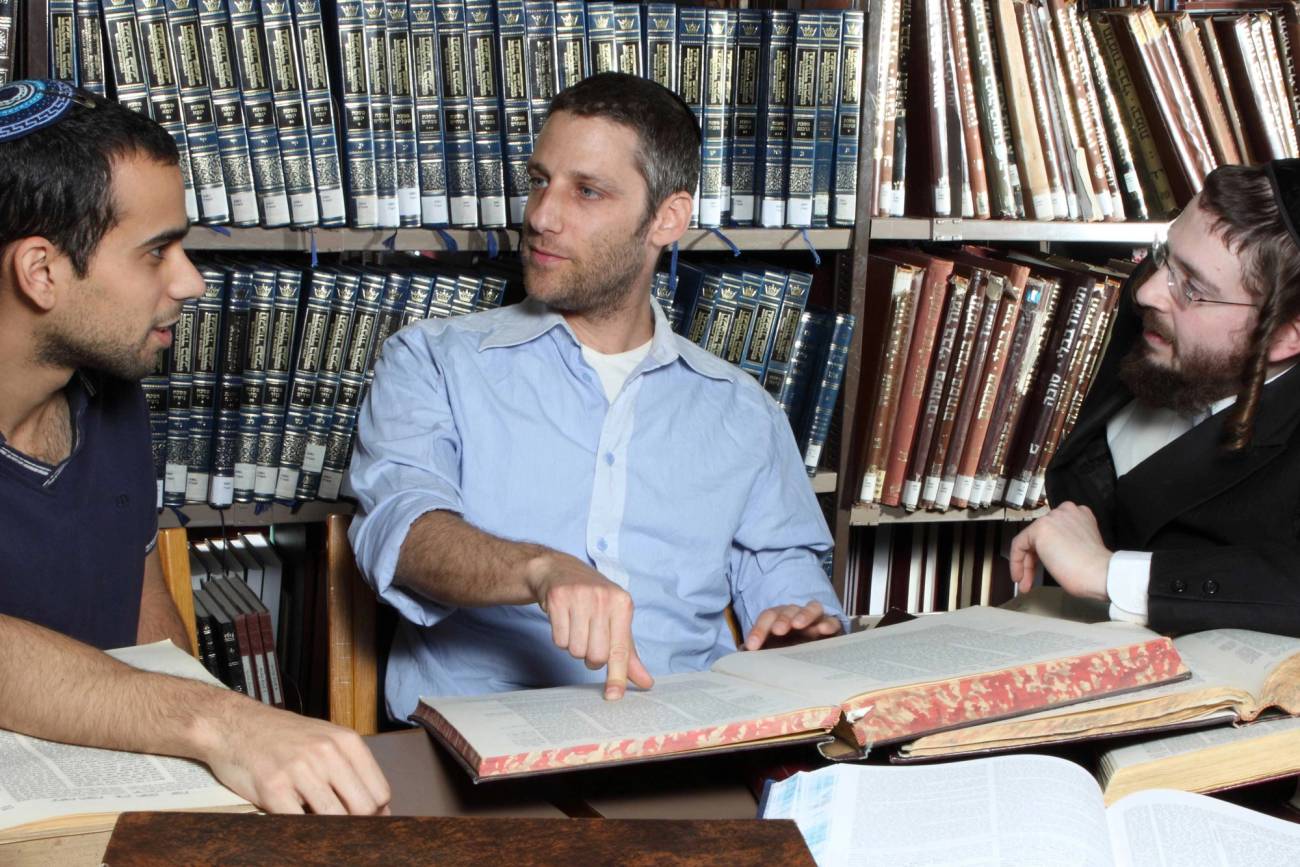How the Talmud Can Change Your Life
It’s the greatest self-help book ever written. And isn’t that what we need right now?

Dan Porges/Getty Images

Dan Porges/Getty Images

Dan Porges/Getty Images
Like so many Jews, I’ve spent the last few weeks drowning in a torrent of terrors. The reports from Israel, documenting the worst single-day massacre of Jews since Hitler’s goons were stopped, are soul-crushing. Beheaded babies, families burned alive, women brutally raped: These stories haunt me, making it difficult to go about my day. And it doesn’t help much to step out in my own city, New York, and see pro-Hamas mobs flashing swastika signs and calling for the destruction of the world’s only Jewish state.
But I’m lucky. I have the best guide ever written to getting through tough times. It’s 2,711 pages long and 1,500 years old, and it’s the greatest self-help book ever written.
It’s the Talmud.
Flip to any random page, and even if you get through the Talmud’s unique design—like an ancient precursor to the internet, it consists of intertwined links, with text and commentary presented together on the same folio—you’re not likely to walk away inspired. To the extent that it’s a book at all—my friend, the writer Jonathan Rosen, called it “a drift net for catching God”—it does much more than merely tell stories. Instead, it records arguments, often intricate ones, almost always without telling you who’s right.
Dive in, however, and you’ll find precisely the pearls of wisdom needed to make it through even the toughest of times. Here’s a taste, a tale of what you ought to do when it seems like your world has come to an end.
The Talmud tells us that when Rabbi Yochanan ben Zakkai—who lived in the first century CE and was widely considered his generation’s leading scholar—realized that the Romans were about to sack Jerusalem, he went to see the emperor. He didn’t ask for mercy; the holy city, he understood, was doomed. Instead, he made three seemingly strange wishes.
He asked the emperor to spare Yavneh, a town in central Israel known as a vibrant center of Torah study. He asked the emperor to protect the family of Rabban Gamliel, a communal leader and the scion of a celebrated rabbinic dynasty. And he asked the emperor to send doctors to heal a wise and righteous rabbi named Tzadok, who was so grief-stricken about the impending catastrophe that he’d stopped eating.
Pay close attention to these requests, and you’ll see principles that can still guide us all today. In times of great upheaval, Rabbi Yochanan knew, we needed to embrace three difficult but essential truths.
First, when the worst happens, we can always start again. Even when our institutions are gutted and our homes burned down, figuratively or literally, we have permission to pack up and find some other place to go, and other people who share our convictions. There’s always Yavneh, a place of refuge that may not be where we had hoped to end up but that would at least keep us safe and see to it that we survive.
But survival, Rabbi Yochanan knew, wasn’t as simple as merely setting up shop elsewhere and announcing that business continues as usual. When you lose something—or someone—you love, you often also lose hope, wondering how life could possibly go on in the face of so much devastation. This is where Rabbi Yochanan’s second request comes in: By insisting that the same rabbinic dynasty that had been in charge for decades remained in place, he tethered the Jews to tradition, giving them an ember to remind them of the great spiritual fires that once burned bright and making them believe that these same fires may burn bright once again.
The biggest piece of the puzzle, though, was still missing: Even with somewhere to live and someone to trust and something to connect them to their more storied past, people still needed concrete instruction on how to live. Enter request number three. Rather than worry about “the Jews,” a mass of people whose names and stories he didn’t and couldn’t know, Rabbi Yochanan made a point of singling out just one man, his suffering friend. By doing so, he set an example of what he wanted the society he was rebuilding to look like. In Rabbi Yochanan’s imagination, the perfect community didn’t prattle on about abstractions like virtue and justice as it stood by idly while its people suffered; it slowed down for long enough to listen to the sobs of just one elderly man, find them intolerable, and step in to help.
These principles guide us still, giving us strength even as so many feel despondent. And they’re preserved in a book—a manual for living with defeat, to quote another wise rabbi, Leonard Cohen—written for broken people in broken times. The Talmud came to be because the Temple in Jerusalem, Judaism’s beating heart for centuries, was burned down in 70 CE. The rabbis saved the old religion from extinction by capturing it in a book. They recorded their stories and their disagreements in 63 sprawling volumes; to read it today is to enter into a conversation uninterrupted by space and time, with one generation offering to the next some sound advice on how to live and asking in return not for obedience but for contemplation and then action.
So Jewish or not, heartbroken or otherwise, jump right in. More than any other book you might’ve read, the Talmud can change your life.
This essay is adapted from “How the Talmud Can Change Your Life: Surprisingly Modern Advice from a Very Old Book,” by Liel Leibovitz, published by W.W. Norton.
Liel Leibovitz is editor-at-large for Tablet Magazine and a host of its weekly culture podcast Unorthodox and daily Talmud podcast Take One. He is the editor of Zionism: The Tablet Guide.